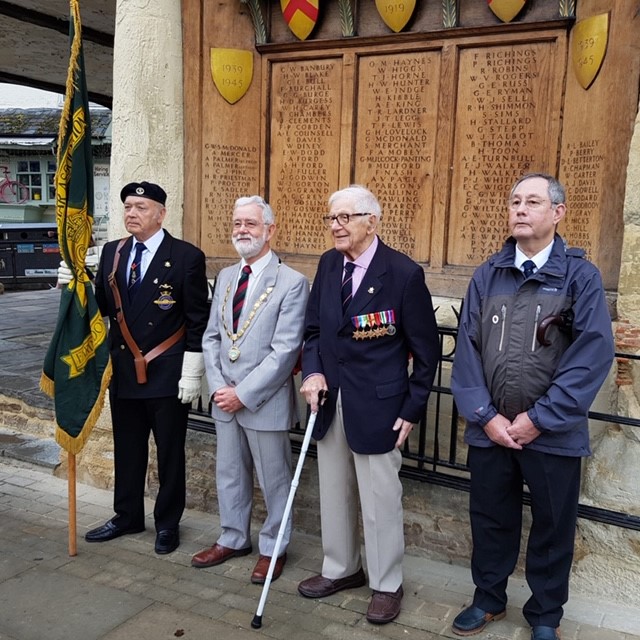On the 15th August 2020, the nation commemorated VJ 75 a formal commemoration centred around the Act of Remembrance, marking both the surrender of Japan and the end of the Second World War.
VJ 75 day remembered and recognised all those who served and sacrificed in the Far East and ultimately brought an end to the Second World War.
The RBL asked all its Members to participate in local activity centred on the Two Minute Silence at 11am on Saturday 15 August in whichever way it was most meaningful to their local community, and within the bounds of the public health guidance on social distancing in the local area.
The Mayor of Faringdon Town Council on the 15th of August 2020 delivered a speech on behalf of the town.
Here is the written speech from Saturday :
VJ-Day
Today marks the 75th anniversary of the surrender of Japan; thereby, ending the last phase of the Second World War. It had been a war against an implacable, merciless enemy that followed a perverted militaristic idea that believed prisoners of war were cowards and could therefore be maltreated or executed at will. There was no Geneva Convention here.
Japan’s expansionist war had started back in 1931 with the occupation of Manchuria followed in 1937 by the invasion of China during which they inflicted unspeakable atrocities on the local populations.
Japanese ambition was to take over the whole of South East Asia and China including the European Controlled territories of French Indo-China: Vietnam, Cambodia and Laos; the Dutch East Indies, now Indonesia; the USA administered Philippines and other Pacific Islands; and the British territories of Hong Kong, Malaya and Burma, and ultimately India and Australia.
Our involvement started on December 7th 1941 with Japan’s declaration of war on the United States and the British Empire with their surprise attacks on the American Naval Base at Pearl Harbor in Hawaii and on Hong Kong the day after where the under-resourced British, Canadian and Indian garrison surrendered on Christmas Day. The Japanese advance was relentless. By the end of January 1942 Malaya had fallen followed two weeks later by Singapore where 80,000 Australian, British and Indian troops were taken prisoner. By mid-1942 all of South East Asia was occupied with exception of a few strategic Pacific Islands.
British and Empire forces withdrew into India, but together with Chinese and US forces kept up continued attacks on Japanese forces in Burma through special operations units like the Brigadier Orde Wingate’s Chindits that operated deep behind enemy lines under atrocious conditions.
In March 1944 the Japanese invaded India from northern Burma. They were eventually stopped at Imphal and a small hill post called Kohima defended by 1,500 troops of the British Indian 14th Army who faced 15,000 Japanese attackers; it was a last ditch battle of intense ferocity; at one point a small defended area, the tennis court, had shrunk to an area of 350 square yards and was contested in hand-to-hand fighting of unbelievable savagery. Eventually, Kohima was relieved and stands out as one of the greatest battles of WW2 which is why the Kohima Epitaph has such significance. The invasion of India had overstretched Japanese resources and cost them 55,000 casualties at a cost to the defenders of 12,600.
This 14th army comprising mainly Indians and Gurkhas with soldiers from East and West Africa, Britain, Australia and New Zealand under the leadership of Lieutenant General William Slim; undersupplied, abandoned by Churchill, who called themselves ‘the forgotten army’ who had fought against disease and malnutrition as well as the enemy, had become a formidable fighting force. They then proceeded to drive the previously unbeatable Japanese out of Burma in one of the greatest military campaigns of WW2. As a result, Bill Slim has been rated as the outstanding commander of the 20th century.
At sea the defeat of the Japanese invasion force by the U.S. Pacific Fleet at Midway Island in June 1942 began the drive to push the Japanese back across the ocean. Occupied islands were liberated in bitter fighting that eventually allowed the Japanese mainland to come into the range of bombers culminating in the invasion of the Japanese island of Okinawa in 1945 anticipating the invasion of the main Japanese islands. The dropping of atomic bombs on Hiroshima and Nagasaki on the 6th and 9th of August and the invasion of Manchuria by the USSR on the 9th forced the Japanese High Command to accept the surrender terms of the Potsdam Convention. Emperor Hirohito announced Japan’s surrender on 15th August 1945.
Although the Japanese had at first been welcomed as liberators by some of the occupied counties or had even allied themselves with Japan, as did Thailand, by the end of the war they had rebelled against their occupiers. These liberation movements eventually led to most of these countries becoming independent states.
The horrendous cost to the men who took part in the war against Japan should never be forgotten, especially those who PoWs. Our War Memorial bears the name of just one man who died in this theatre of war; Gunner Reginald Walter Frank Luckett.
He was a member of 95 Battery 48 LAA Regiment RA, defending Andir Airfield in Java. His colleagues in 49 Battery were deployed around an airfield near what is now Jakarta. The Japanese landed in Java on the night of 28 February 1942 over-running 49 Battery. After surrendering, all the 49 battery survivors were executed.
95 Battery was over-run by Japanese tanks on 8 March. Those men who survived were shipped to Singapore where they embarked on 29 October in the Singapore Maru and sailed the next day, arriving in Japan on 24th November and disembarking on the 26th. Reginald Luckett died the day after; he was 32. The Singapore Maru was one of the hell ships, deployed by the Japanese to transport PoWs, on which men died from starvation and disease in conditions of cruelty too harrowing to describe here. Affadavits written by witnesses for the war crimes tribunals, describing conditions on the Singapore Maru, can be seen in the WW2 memorial books available on the Town Council and Faringdon.org. websites and in Faringdon Library.
We will remember them.
Mike Wise

